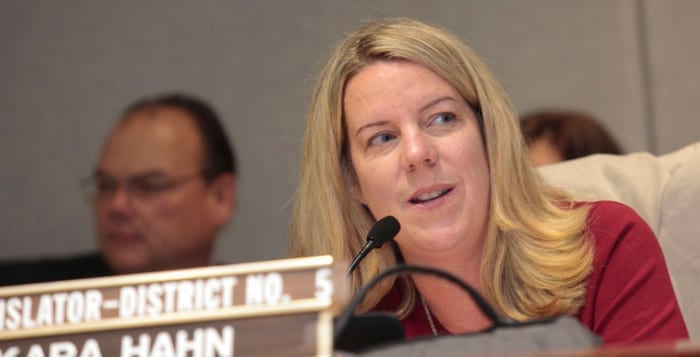Like a tidal wave slamming into the shore the #MeToo and #TimesUp movements, born of high-profile sexual assault and sexual harassment cases becoming public, are decimating decades-old culturally accepted standards regarding behavior in the workplace and otherwise. In an effort to keep up with rapidly shifting societal norms, lawmakers from local town governments all the way up through the federal level are examining existing laws pertaining to workplace sexual misconduct while also crafting new ones to cover potential lapses — in government and the private sector.
Laura Ahearn, an attorney and the executive director of The Crime Victims Center, a nonprofit dedicated to the prevention of sexual abuse and rape, as well as providing support for victims of violent crimes, said she views the #MeToo movement as a valuable opportunity.
“The #MeToo movement has created an ideal climate for us to call upon legislators to help us change a culture which has minimized sexual harassment and a society or environment whose prevailing social attitudes have the effect of normalizing or trivializing sexual assault and sexual harassment,” she said, adding her organization, which runs the Parents for Megan’s Law website, has many state-level legislative priorities currently in the works.
“Women have been taught to believe that performing sexual favors for their bosses is part of the job.”
— Marjorie Mesidor
While cases of harassment, assault and general sexual misconduct involving prominent men in government and the entertainment industry are resulting in serious consequences, through loss of employment or social pariah status, low-profile offenders, especially from the private sector, are likely avoiding them. Creating concrete ways to punish offenders operating out of the public eye will be a challenge for lawmakers going forward.
According to Suffolk County Legislator Sarah Anker (D-Mount Sinai), the county passed legislation in December mandating all elected officials and department heads be trained on sexual harassment and assault by the Office of Labor Relations.
The law mandates elected officials and department heads be trained starting 2018, and again every two years. Anker said she’s hoping to amend the law to make it mandated that every new hire be educated once taking a position.
Marjorie Mesidor, a partner at New York City’s Phillips & Associates law firm, which specializes in employment discrimination and sexual harassment cases, said she was floored to hear the law was only just put in place.
“Great progress,” she said. “I’m not mocking it, but my stomach is churning.”
Mesidor pointed at state and federal laws that require a complaint to be filed in order for businesses with management-level employees accused of harassment to be legally held liable as a deterrent in justice being achieved for victims. She said when formal complaints are made by employees, cross examination follows that takes on the tone of “slut shaming.” She said that in itself is enough to prevent many women from filing initial complaints, thus harming their harassment cases in the future.
“I’ve seen a trend of cases come into our office of women who are in forced sexual relationships with their bosses over time,” she said. “They’ve been taught to believe that performing sexual favors for their bosses is part of the job.”
“What about someone working in a deli, the restaurant waitress — their jobs, their life depend on that paycheck from the boss who might just be making them uncomfortable … It might be much worse.”
— Kara Hahn
Employees and employers in the private sector are often unaware of their rights and what constitutes harassment that would hold up in court, according to Mesidor. She said New York City Human Rights Law doesn’t require formal complaints, and should be looked to as an example for writing harassment laws.
Bills are currently in committee in the U.S. Senate and House of Representatives that would amend the Congressional Accountability Act of 1995, a law passed to require Congress to follow employment and workplace safety laws applied to the business world. The Senate version of the bill, sponsored by Sen. Kirsten Gillibrand (D-New York), if passed, would reform procedures for investigating harassment complaints in Congress and require public announcement of the offender and the dollar amount in the cases where settlements are reached. This week, Newsday reported more than $10 million of taxpayer money has been used to settle 88 sexual harassment, discrimination and other related cases in state government over the last nine years.
Brookhaven Town Councilwoman Valerie Cartright (D-Port Jefferson Station) said she would like to see laws put in place requiring businesses to adopt best practices when it comes to sexual harassment, rather than simply providing legal cover for the ones that do.
Legislator Kara Hahn (D-Setauket) agrees.
“What about someone working in a deli, the restaurant waitress — their jobs, their life depend on that paycheck from the boss who might just be making them uncomfortable,” she said. “It might be much worse.”
In October 2015, New York Gov. Andrew Cuomo (D) signed legislation to prevent harassment in the workplace. The legislation directed the state Department of Labor and Division of Human Rights to make training available to employers to help them develop policies, procedures and their own training to address and eliminate discrimination and harassment in the workplace. Cuomo signed legislation “Enough is Enough” that year, which requires all colleges to adopt a set of comprehensive procedures and guidelines, including a uniform definition of affirmative consent, a statewide amnesty policy and expanded access to law enforcement.






